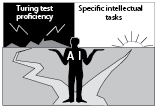Turing Test misleads AI research
The Turing Test motivates AI researchers to accomplish a misleading goal—the general but arbitrary form of intelligence involved in carrying on normal conversation.
This kind of intelligence is arbitrary in that it is relative to specfic cultures.
AI researchers should focus instead on specific intellectual tasks that can be aggregated to form more generally intelligent systems, such as the ability to recognize patterns, solve differential equations, etc.

B. Meltzer, 1971.